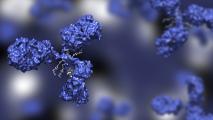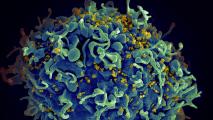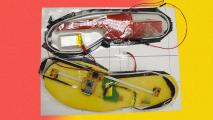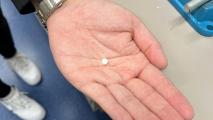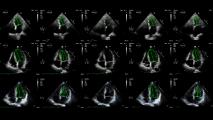
Biotech
Human history has been all but defined by death and disease, plague and pandemic. Advancements in 20th century medicine changed all of that. Now advancements in 21st century medicine promise to go even further. Could we bring about an end to disease? Reverse aging? Give hearing to the deaf and sight to the blind? The answer may be yes. And soon.
More
How NASA is planning to prevent a Martian plague
When Mars samples arrive, they may carry more than knowledge. To offset the chance of a Martian pandemic, NASA is learning to contain a Red Planet plague.
Breakthrough drug could save hundreds of thousands of children’s lives
A booster dose of the University of Oxford’s malaria vaccine demonstrated up to 80% efficacy in children over a year of follow-up.
How to be happy: Aristotle’s 11 guidelines for a good life
In his Nicomachean Ethics, Aristotle proposed that humans are social, rational animals who seek to “live well.”
Newly discovered antibody neutralizes all variants of the coronavirus
Using modified mouse models originally designed for HIV, researchers have discovered an antibody that stops all known strains of COVID-19.
At long last, we might have an HIV vaccine
Due to HIV-1’s extraordinary diversity, a vaccine needs to induce antibodies that can target many different strains.
Procrastinating is linked to health and career problems – but here’s how you can stop
In the long run, procrastination isn’t an effective way of managing emotions and causes health and work setbacks.
First-of-its-kind trial will attempt to grow mini livers in people
A new treatment that could turn a single donor liver into “mini livers” capable of saving 75 or more lives is heading into human trials.
Woman with rare gene mutations feels no pain, anxiety
A woman in Scotland was found to feel virtually no pain and report zero trace of any anxiety or depression.
Microdosing’s benefits may be powered by belief
A small, double-blind, placebo-controlled study has found evidence that expectations may be behind microdosing’s beneficial effects.
Shoe wearable could help Parkinson’s patients avoid falling
Data-collecting sensors in shoes can predict a Parkinson’s patient’s fall risk almost as accurately as standard walking tests.
Insulin pills could end the need for painful injections
Insulin pills designed to be dissolved in the mouth appear to overcome a major hurdle holding back the development of oral insulin.
This 20-year chart of depression diagnoses shows an incredible shift
People are being diagnosed with depression earlier than in the past because of a decrease in stigma and better diagnostic guidelines.
First-of-its-kind trial shows AI beat humans at analyzing heart scans
Echonet, an AI trained to assess a measure of heart function, has outperformed trained technicians in both accuracy and efficiency.
To make great changes in your life, follow the philosophy of kaizen
Kaizen asks us to make small changes, slowly and over time. It’s a hard skill to master in an age of instant gratification.
Dolphins use signature whistles to represent other dolphins – like names
Bottlenose dolphins are extremely social animals that communicate constantly, and consistently use signature whistles for one another.
FDA authorizes updated COVID-19 boosters
The FDA has authorized Pfizer-BioNTech’s and Moderna’s updated COVID-19 boosters, which target the now-dominant Omicron subvariants.
CRISPR fully reprograms mammal genome for the first time
CRISPR has been used to rearrange the chromosomes of lab mice, a world’s first in mammals and a breakthrough in bioengineering.
An ancient technique can improve your attention span
Life’s modern distractions, such as news and social media, have overwhelmed our evolutionarily designed attention spans.
Is your mind just a parasite on your physical body?
What if there is nothing special about self-awareness? What if it is just evolutionary dead weight, bound to disappear soon?
Breakthrough in photosynthesis boosts plant growth up to 30%
In a small study, researchers have engineered soy plants to have higher yields thanks to improved photosynthesis.
Get inspired with the most innovative stories shaping the world around us.
















